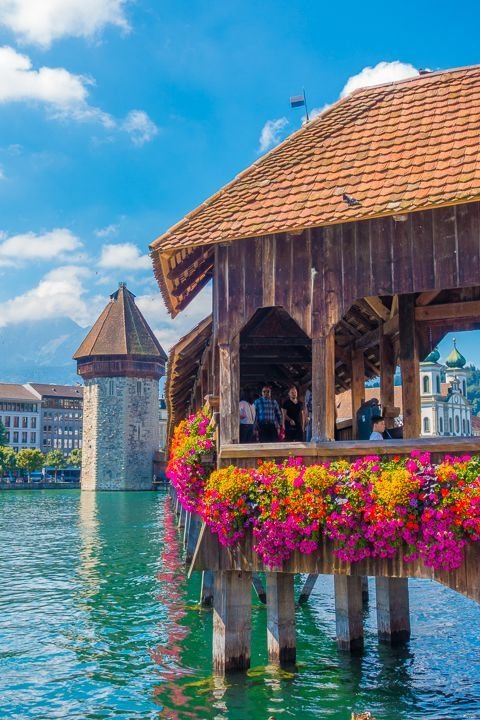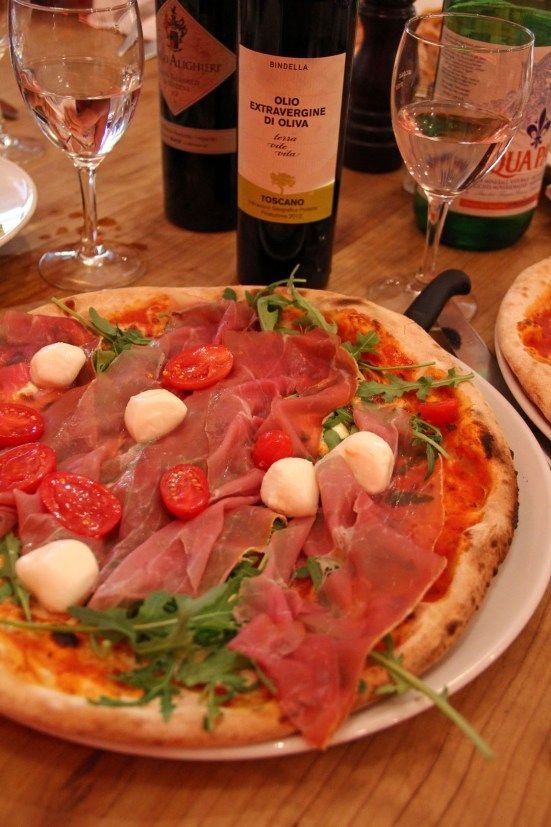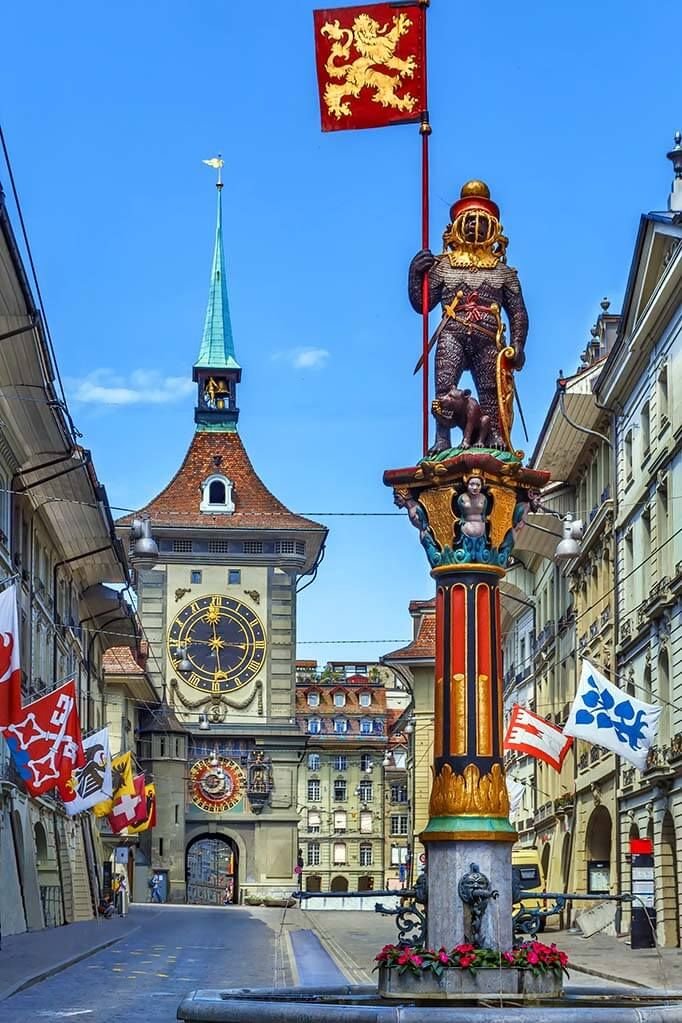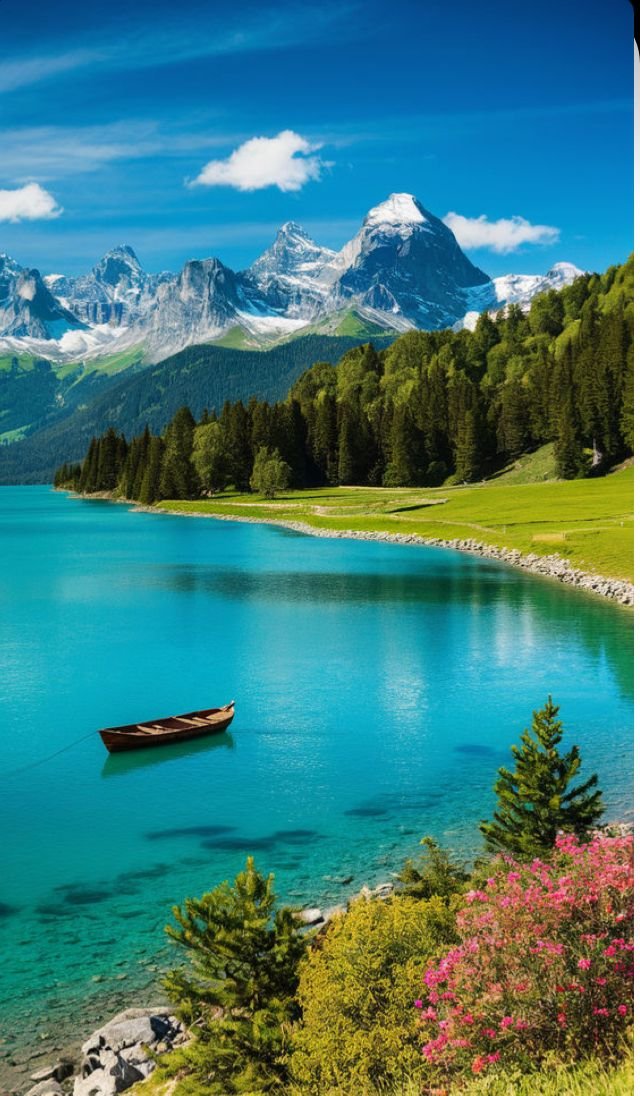Switzerland
Welcome to Switzerland
Switzerland, the heart of Europe, is a land where snow-capped peaks meet crystal-clear lakes, and cosmopolitan cities blend seamlessly with timeless alpine villages. Whether you’re drawn by the call of adventure, the allure of luxury, or the promise of tranquil scenery, Switzerland in 2025 promises a travel experience that is as diverse as it is unforgettable.
Switzerland is renowned for its dramatic landscapes, efficient public transport, and a culture that cherishes both tradition and innovation. From the majestic Matterhorn and the serene shores of Lake Geneva to the vibrant streets of Zurich and the medieval charm of Bern, every corner of the country offers something unique. In 2025, Switzerland is embracing a “Travel Better” ethos, focusing on sustainability, authentic local experiences, and making travel more accessible and enjoyable for all.
Why Visit Switzerland?
1.
Natural Wonders and Outdoor Adventure: Switzerland’s geography is a playground for nature lovers. Ski or snowboard in Zermatt, hike the pristine trails of the Bernese Oberland, or simply soak in the panoramic views from a scenic train ride like the Glacier Express.

2.
Culture, Cuisine, and Charm: Beyond its landscapes, Switzerland entices with world-class museums, historic old towns, and culinary delights. Savor fondue in a mountain chalet, wander through lively city markets, or discover the quiet beauty of villages like Appenzell and Evolène.

Planning Your Trip
Visa Information
Switzerland is part of the Schengen Area. Most travelers from the EU, US, UK, Canada, Australia, and many other countries do not need a visa for stays up to 90 days within a 180-day period. However, in 2025, a new ETIAS (European Travel Information and Authorization System) is expected to be introduced. This will require eligible travelers to complete a quick online application (costing around €7) before arrival. The ETIAS is typically approved instantly but should be applied for at least four to five days in advance. Biometric checks (fingerprints and facial scans) may also be introduced at entry points, so keep up-to-date with the latest requirements before you travel.
Best Time to Visit
Switzerland is a year-round destination, with each season offering a distinct charm:
- Spring (March–May): Wildflowers bloom, and hiking trails open up as the snow melts. Cities like Zurich and Lucerne come alive with festivals.
- Summer (June–August): Ideal for hiking, lake swimming, and exploring vineyards. The weather is warm, and the countryside is lush and green.
- Autumn (September–November): Vineyards in regions like Lavaux turn golden, and food festivals abound. It’s a quieter time with fewer tourists.
- Winter (December–February): Switzerland transforms into a snowy wonderland. Ski resorts in the Valais, Graubünden, and Bernese Oberland are at their peak, offering world-class slopes and festive alpine villages.
Getting To and Around
Getting To Switzerland
Switzerland is easily accessible by air, rail, and road. Major international airports are located in Zurich, Geneva, and Basel, with excellent connections to cities worldwide. High-speed trains link Switzerland to neighboring countries such as France, Italy, Germany, and Austria, making cross-border travel seamless.
Getting Around Switzerland
Switzerland’s public transportation system is among the best in the world-punctual, clean, and comprehensive. The Swiss Travel Pass is highly recommended for visitors, offering unlimited travel on trains, buses, boats, and even some mountain cableways. It also includes free or discounted entry to over 500 museums and attractions, plus scenic routes like the Glacier Express and Bernina Express15.
For real-time schedules and travel updates, the SBB Mobile app is a must-have tool. If you prefer driving, car rentals are available, but note that many alpine villages (like Zermatt) are car-free, and parking in cities can be expensive.

Accommodation
Switzerland offers a wide range of accommodation options to suit every travel style and budget, from luxurious hotels and charming alpine lodges to budget hostels and unique themed stays.
Hotels and Resorts
The country boasts over 2,000 hotels, including internationally renowned luxury brands and boutique properties. Cities like Zurich, Geneva, Basel, and Lucerne feature upscale hotels with modern amenities, spas, and fine dining. Mountain resorts such as those in Grindelwald, Zermatt, and St. Moritz offer ski-in/ski-out access and breathtaking views. For example, Bergwelt Grindelwald Alpine Design Resort combines comfort with stunning alpine scenery, offering wellness facilities and easy access to hiking and skiing.
Budget and Mid-Range Options
For travelers on a budget, Switzerland has numerous hostels, guesthouses, and holiday apartments. Prices vary widely depending on location. Major cities and lakeside regions like Lake Zurich and Lake Geneva tend to be the most expensive, with median rents for a 3.5-room apartment around CHF 2,500 per month in Zurich, while smaller towns like Biel/Bienne offer more affordable options around CHF 1,490. Booking platforms and local travel centers provide extensive listings to help find the best deals.
Unique and Themed Accommodations
For a memorable stay, consider themed hotels such as historic castles, wellness oases, or the innovative Million Stars Hotels, which include bubble hotels, tiny houses, and outdoor beds with spectacular views of the night sky. These options allow guests to connect deeply with nature and enjoy a truly Swiss experience.
Other Options
Farm stays, alpine huts, and campsites are also popular, especially for those seeking a rustic or nature-immersive experience. Many alpine huts provide basic accommodation with meals, ideal for hikers and outdoor enthusiasts.
Tips for Booking
- Book well in advance, especially for peak seasons like winter ski months and summer hiking periods.
- Consider the Swiss Travel Pass, which often includes discounts on some accommodations and easy access to public transport.
- Be aware that some alpine villages, such as Zermatt, are car-free, so plan transportation accordingly.

Food and Drink
Switzerland’s culinary scene is as diverse as its landscapes, blending traditional alpine flavors with cosmopolitan influences.
Traditional Swiss Cuisine
Swiss food is hearty and comforting, perfect after a day outdoors. Signature dishes include:
- Fondue: Melted cheese served with bread cubes, a communal and iconic Swiss meal.
- Raclette: Melted cheese scraped over potatoes, pickles, and onions.
- Rösti: Crispy fried grated potatoes, often served as a side or topped with eggs or cheese.
- Zürcher Geschnetzeltes: Sliced veal in a creamy mushroom sauce, usually accompanied by rösti.
These dishes vary regionally, reflecting the country’s linguistic and cultural diversity.
Local Specialties by Region
- In the French-speaking part, enjoy dishes like papet vaudois (leek and potato stew with sausage).
- The Italian-speaking Ticino region offers Mediterranean-inspired cuisine, including polenta and risotto.
- The German-speaking regions emphasize meat, cheese, and bread-based dishes.
Modern and International Cuisine
Switzerland’s cities boast a vibrant dining scene with Michelin-starred restaurants, innovative chefs, and international flavors. Zurich, Geneva, and Basel are culinary hubs where you can find everything from Japanese sushi to Middle Eastern mezze.
Chocolate and Pastries
Swiss chocolate is world-famous, and no trip is complete without sampling artisanal chocolates and pralines. Bakeries offer delightful pastries like Nidelkuchen (cream cake) and Basler Läckerli (spiced gingerbread).
Drinks
- Switzerland produces excellent wines, especially white wines from the Lavaux vineyards along Lake Geneva and reds from Valais.
- Local craft beers and ciders have grown in popularity.
- For non-alcoholic options, try Rivella, a unique Swiss soft drink made from milk whey.
Dining Tips
- Many mountain restaurants serve traditional dishes with spectacular views, perfect for a midday break.
- Swiss dining can be pricey; lunch menus and takeaway options offer more affordable ways to enjoy local flavors.
- Tipping is appreciated but not obligatory, as service charges are included in prices.
Switzerland’s food culture is a reflection of its rich heritage and modern openness, offering visitors a delicious journey alongside its stunning landscapes.

Must-See Attractions
- The Matterhorn
One of the most famous mountains in the world, the Matterhorn is a symbol of Switzerland’s majestic Alpine beauty. Located near Zermatt, it offers stunning views and photo opportunities. The surrounding area features charming villages and excellent hiking trails. - Jungfraujoch – The Top of Europe
At 3,454 meters, Jungfraujoch is Europe’s highest railway station. The journey there is as spectacular as the destination, passing through tunnels and offering panoramic views of the Eiger, Mönch, and Jungfrau peaks. Visitors can explore the Ice Palace, admire glaciers, and enjoy the Sphinx Observatory’s sky-high vistas. - Lake Geneva and Château de Chillon
Lake Geneva, Europe’s largest Alpine lake, is surrounded by vineyards, historic towns, and cultural attractions. The medieval Château de Chillon sits on its shores near Montreux, offering a glimpse into Switzerland’s past with its well-preserved halls and ramparts. - Lucerne and Chapel Bridge
Lucerne is a picturesque city with a medieval old town, famous for the Chapel Bridge (Kapellbrücke), a wooden covered bridge adorned with paintings. The city also offers boat cruises on Lake Lucerne and access to nearby mountains like Pilatus and Rigi. - Bern Old Town and Bear Park
Switzerland’s capital, Bern, boasts a UNESCO World Heritage-listed old town with cobblestone streets, historic fountains, and the iconic Zytglogge clock tower. The Bear Park is a unique urban sanctuary where you can observe bears in a natural habitat. - Rhine Falls
Europe’s largest waterfall, Rhine Falls near Schaffhausen, is a spectacular natural wonder. Visitors can take boat trips close to the falls or enjoy panoramic views from viewing platforms. - Swiss National Park, Zernez
Switzerland’s only national park offers pristine wilderness, hiking trails, and wildlife spotting opportunities including ibex, marmots, and golden eagles. - Montreux and Lavaux Vineyards
Montreux, famous for its jazz festival, is a vibrant lakeside town. Nearby, the terraced vineyards of Lavaux stretch along Lake Geneva, offering scenic walks and wine tasting with stunning views. - Zurich Old Town and Museums
Zurich combines modern urban life with historic charm. Explore its old town, visit the Swiss National Museum, and enjoy world-class art at Kunsthaus Zurich. - The Glacier Express and Bernina Express
These scenic train journeys connect some of Switzerland’s most beautiful regions. The Glacier Express runs between Zermatt and St. Moritz, crossing 291 bridges and 91 tunnels. The Bernina Express offers spectacular views of glaciers and alpine landscapes.

Must-Do Activities
- Hiking and Trekking in the Alps
Switzerland’s extensive trail network caters to all levels, from gentle lakeside strolls to challenging mountain hikes. Popular routes include the Eiger Trail near Grindelwald, the Lauterbrunnen Valley hike with its waterfalls, and the scenic Stoos Ridge Hike. - Skiing and Snowboarding
In winter, resorts like Zermatt, St. Moritz, Verbier, and Saas-Fee offer world-class skiing and snowboarding. 2025 sees continued investment in sustainable ski tourism with eco-friendly lifts and snowmaking. - Scenic Boat Cruises
Cruise on Lake Geneva, Lake Lucerne, or Lake Brienz to enjoy Switzerland’s landscapes from the water. These cruises often include stops at charming towns and castles. - Explore Swiss Cities by Foot or Bike
Walk or cycle through cities like Zurich, Bern, and Lausanne to discover hidden gems, vibrant markets, and historic sites. Many cities have well-maintained bike paths and bike rental services. - Visit Museums and Cultural Sites
Switzerland has numerous museums, from the Swiss Museum of Transportation in Lucerne to the Olympic Museum in Lausanne and the Lindt Home of Chocolate near Zurich. These offer engaging insights into Swiss history, innovation, and culture. - Take a Cable Car or Funicular Ride
Experience breathtaking views by ascending mountains like Pilatus, Rigi, or Stanserhorn via cable cars or funiculars. Some rides, like the Schynige Platte cogwheel train, combine heritage with stunning panoramas. - Wildlife Watching
Visit places like the Bear Park in Bern or the Swiss National Park for wildlife encounters. Birdwatchers and nature lovers will appreciate the diverse fauna in these protected areas. - Attend Festivals and Local Events
2025 features numerous cultural events such as the Montreux Jazz Festival, Lucerne Festival, and traditional alpine celebrations. These offer a chance to experience Swiss music, food, and customs firsthand. - Try Swiss Culinary Experiences
Indulge in fondue, raclette, and other Swiss specialties in mountain huts or cozy city restaurants. Food markets and wine tastings in regions like Lavaux add to the gastronomic adventure. - Ride Historic Trains and Railways
Beyond the Glacier and Bernina Express, explore heritage railways like the Brienz Rothorn steam train or the Gornergrat railway for nostalgic journeys through stunning landscapes.

Travel Tips
Switzerland is a dream destination for many, known for its pristine landscapes, efficient infrastructure, and harmonious blend of cultures. To ensure your trip is smooth, safe, and respectful, here’s what you need to know about safety, local customs, and language basics.
Safety Advice
General Safety
Switzerland is one of the safest countries in Europe, with low rates of violent crime and a strong police presence. Most visitors experience trouble-free travel, but petty crime-especially pickpocketing and bag snatching-does occur, particularly in busy cities like Zurich, Geneva, Bern, and Basel, and at airports, train stations, and on public transport. Always keep your valuables secure, use zipped bags, and avoid leaving belongings unattended or in overhead compartments on trains. Car break-ins can happen, especially in tourist areas and highway rest stops, so never leave valuables in your car, even for a short time.
Transport Safety
Public transport is extremely safe and reliable, but always validate your ticket-fines for fare evasion are steep. If driving, roads are well maintained, but weather in alpine areas can change rapidly, so be prepared for snow and ice, especially in winter.
Women’s Safety
Switzerland is safe for solo female travelers. Still, as everywhere, avoid deserted areas at night and stay aware of your surroundings. Catcalling is rare but can happen, particularly in larger cities.
Scams and Fraud
Credit card and ATM fraud, though rare, can occur. Use ATMs in well-lit, public areas or inside banks, cover your PIN, and check statements for unauthorized transactions. Avoid using public Wi-Fi for sensitive transactions, and never accept food or drinks from strangers in bars or clubs to avoid the risk of spiking.
Natural Hazards
In mountain regions, avalanches, landslides, and sudden weather changes are possible. Always check local advisories before hiking or skiing, and follow marked trails.
Other Tips
- Swiss laws are strictly enforced. Fines for minor offenses-like jaywalking, littering, or not having a valid train ticket-are high.
- Demonstrations and soccer matches can occasionally become rowdy; avoid these areas if possible.
- Emergency number: 112 for general emergencies, 117 for police, 118 for fire, and 144 for medical emergencies.
Local Customs
Politeness and Punctuality
Swiss society values courtesy, discretion, and punctuality. Always greet with a polite “Grüezi” (hello) or “Bonjour” depending on the region, and shake hands when meeting someone new. Arriving late, even by a few minutes, is considered rude.
Quiet and Order
Noise is discouraged, especially in public spaces and on public transport. Keep conversations at a moderate volume, and respect “quiet zones” on trains. Sundays are considered a day of rest; avoid making noise or doing laundry in residential buildings on this day.
Dress Code
Dress is generally smart-casual. Even in cities, people tend to dress neatly. When visiting churches or upscale restaurants, avoid shorts and sleeveless tops.
Tipping
Service charges are included in restaurant bills, but rounding up or leaving small change is appreciated for good service.
Recycling and Cleanliness
Switzerland is exceptionally clean and environmentally conscious. Sort your waste according to local rules, and never litter-fines are enforced.
Personal Space
Swiss people value personal space and privacy. Avoid standing too close or engaging in loud, public displays of affection.
Language Basics
Switzerland has four official languages: German (spoken by about 60% of the population), French, Italian, and Romansh. English is widely spoken in tourist areas, hotels, and restaurants, but learning a few local phrases is always appreciated.
Swiss German (Schweizerdeutsch) – Central and Eastern Switzerland
- Hello: Grüezi (formal), Hoi (informal)
- Thank you: Danke
- Please: Bitte
- Goodbye: Auf Wiedersehen
- Yes/No: Ja/Nein
French – Western Switzerland
- Hello: Bonjour
- Thank you: Merci
- Please: S’il vous plaît
- Goodbye: Au revoir
- Yes/No: Oui/Non
Italian – Southern Switzerland (Ticino)
- Hello: Buongiorno
- Thank you: Grazie
- Please: Per favore
- Goodbye: Arrivederci
- Yes/No: Sì/No
Romansh – Small areas in Graubünden
- Hello: Allegra
- Thank you: Grazia
Useful English Phrases
Most Swiss people in urban areas and tourist destinations speak English, especially younger generations and those working in hospitality. However, outside major cities, English may be less common, so basic local greetings and polite phrases go a long way.
Final Tips for a Smooth Journey
- Carry a copy of your passport and keep the original in a safe place.
- Respect local customs and laws-Switzerland is orderly and expects visitors to be the same.
- Enjoy the multicultural atmosphere, try local specialties, and don’t be afraid to ask for help-Swiss people are polite and willing to assist, especially if you approach them with a friendly greeting.
With these tips, you’ll be well-prepared to enjoy Switzerland’s beauty, safety, and hospitality in 2025.

